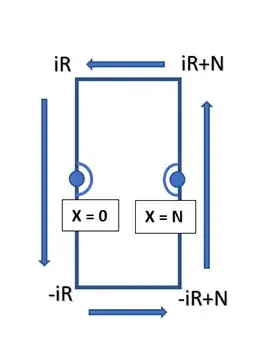We can try to get the full asymptotics of the sum $\,\,S_N=\displaystyle \sum\limits_{n=1}^{N-1} \frac{(-1)^n}{\sqrt{1-\cos{\frac{2\pi n}{N}}}}\,\,$ at $\,\,N\to\infty$
$$S_N=\frac1{\sqrt2}\sum\limits_{n=1}^{N-1} \frac{(-1)^n}{\sin{\frac{\pi n}{N}}}$$
Now let's go in the complex plane and consider the integral $\,\,\displaystyle I_C=\frac{1}{\sqrt2\,2\pi i}\oint_C\frac{\pi}{\sin\pi z}\frac{dz}{\sin\frac{\pi z}N}\,\,$ along the following rectangular contour with two added arches of the small radius $\,\pi\epsilon\,$ (around $z=0$ and $z=N$, clockwise)

There are $N-1$ poles inside the contour (at $z=1, 2, ...N-1$). Evaluating residues of the integrand, we get
$$I_C=\frac1{\sqrt2}\sum\operatorname{Res}\frac{\pi}{\sin\pi z}\frac1{\sin\frac{\pi z}N}=S_N$$
On the other hand, leading $R\to\infty$, using the fact that $N$ is even and making the substitution $z=ix/\pi$
$$I_C=\frac{2\sqrt2i}{2\pi i}\int_\epsilon^\infty\frac{dx}{\sinh x\sinh\frac xN}+I_{C_\epsilon}\tag{1}$$
where the integral along the arches
$$I_{C_\epsilon}=\frac{\sqrt2i}{2\pi i}\int_\pi^0\frac{\epsilon e^{i\phi}id\phi}{\sinh(\epsilon e^{i\phi})\sinh\frac{\epsilon e^{i\phi}}N}=\frac{N}{\pi \epsilon\sqrt2}\int_\pi^0e^{-i\phi}id\phi+O(\epsilon)=-\frac{\sqrt2\,N}{\pi\epsilon }+O(\epsilon)\tag{2}$$
From (1) and (2) follows
$$S_N=\frac{\sqrt2}{\pi}\left(\int_\epsilon^\infty\frac{dx}{\sinh x\sinh\frac xN}-\frac N\epsilon\right)+O(\epsilon)=\frac{\sqrt2\,N}{\pi}\int_\epsilon^\infty\left(\frac1{N\sinh x\sinh\frac xN}-\frac 1{x^2}\right)dx+O(\epsilon)$$
The integrand is regular at $x\to0$; therefore, leading $\epsilon \to 0$
$$S_N=\frac{\sqrt2\,N}{\pi}\int_0^\infty\left(\frac1{N\sinh x\sinh\frac xN}-\frac 1{x^2}\right)dx\tag{3}$$
Just to draw the attention to the fact that this is an exact formula for the sum; from here we can derive as many asymptotic terms as we want.
Decomposing $\,\sinh\frac xN\,$ in the first term ($N\to\infty$)
$$S_N=\frac{\sqrt2\,N}{\pi}\left(\int_0^\infty\left(\frac1{\sinh x}-\frac1x\right)\frac{dx}x-\frac1{6N^2}\int_0^\infty\frac x{\sinh x}dx\right)+O\Big(\frac1{N^3}\Big)\tag{4}$$
The first integral can be evaluated by means of analytical continuation (other approaches are, for example, here or here)
$$\int_0^\infty\left(\frac1{\sinh x}-\frac1x\right)\frac{dx}x=-\ln2\tag{4a}$$
The evaluation of the second integral is straightforward:
$$\int_0^\infty\frac x{\sinh x}dx=\int_0^\infty\left(\frac1{e^x-1}+\frac1{e^x+1}\right)xdx=\Gamma(2)\Big(\zeta(2)+\eta(2)\Big)=\frac{\pi^2}4\tag{4b}$$
Putting (4a) and (4b) into (4)
$$S_N=-\,\frac{\sqrt2\ln2}{\pi}N-\frac\pi{12\sqrt2}\frac1N+O\Big(\frac1{N^3}\Big)$$
Numeric check confirms the result. The full asymptotics can also be obtained.
To note that the first (linear) term can be easily obtained by means of the approximation proposed by @J.G. in the comment.
